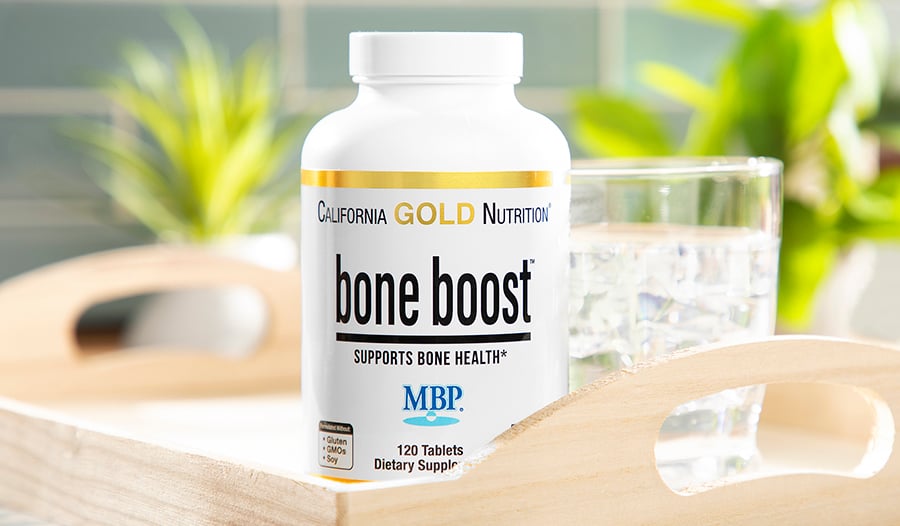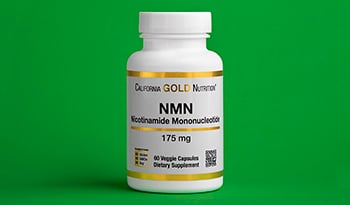Why Bone Health Is Essential to Anti-Aging + 7 Key Supplements

Why Bone Health Is Key to Healthy Aging
One of the keys to healthy aging and longevity is bone health. As we age, our risk for bone loss increases. If bone loss exceeds a certain threshold, bones are considered to be osteoporotic and the individual to have osteoporosis. In cases of osteoporosis, the bones have become so weak that fractures are common from normal everyday activities or minor trauma. These fractures include hip fractures, which can put a person’s life at risk.
Estimates suggest that the prevalence of osteoporosis throughout the world’s adults is 18.3%. Almost 1 in 5 individuals has bones so weak, they are predisposed to fractures. In 1990, an estimated 1.66 million hip fractures occurred worldwide. By 2050, it is expected that 6.26 million hip fractures will occur per year. Approximately 90% of these fractures are in people over age 50, with the preponderance of injuries caused by falls from standing height. Moreover, women are at much greater risk, around double that of men.
For any anti-aging strategy, bone health should not be excluded. Fortunately, a number of approaches show potential benefits for supporting bone health, from minerals, including calcium, magnesium, potassium, and zinc, to vitamins D3 and K2. Beyond supplements, weight-bearing exercise should also be included in any bone-health regimen to increase bone mineral density.
Calcium and Vitamin D
When people think of bone health, they often think of calcium—and for good reason. Calcium and phosphorus are the main minerals that make up between 80%-90% of the solid, mineralized portion of bone tissue. By far, the most common recommendation for preserving bone health is to consume adequate calcium.
Recommendations for vitamin D and bone health are also quite common. Vitamin D is synergistic with calcium because it upregulates the absorption of calcium from the digestive tract, ensuring more calcium is available for the body.
While controversy around the effectiveness of calcium and vitamin D for preventing osteoporosis and fractures has surfaced recently, the latest meta-analyses still suggest that consuming calcium and vitamin D reduce hip fracture risk in older adults. Supplementation is still warranted for maintaining bone health, although with some precautions in regard to calcium.
While calcium has been shown to protect bone health, some research has found correlations between calcium supplementation and heart disease. Interestingly, while calcium from food appears to have no effect, calcium supplements may raise heart disease and heart attack risks. However, these risks look to be mitigated when calcium is supplemented with vitamin D. For anyone taking calcium supplements, vitamin D might help to prevent the potential for increased heart disease risks seen with calcium supplementation alone.
Magnesium
While calcium gets most of the attention when it comes to bone health, magnesium should not be ignored. Magnesium is crucial for numerous functions in the body, including the activation of vitamin D. In 2009, enough evidence existed for the European Food Safety Alliance to declare a cause and effect relationship between magnesium intake and maintaining bone health.
Low magnesium levels in the blood have been correlated with osteoporosis with 30%-40% of subjects with osteoporosis showing low magnesium status upon testing. Bone loss is more common for individuals with a lower dietary magnesium intake, and fracture risk is higher. Furthermore, low intake of magnesium is common. Concerningly, low magnesium intake is also correlated with diabetes, heart disease, stroke, and other chronic diseases—not just poor bone health.
As for magnesium supplementation and bone health, the studies appear to show significant benefits. Magnesium generally helps preserve bone mineral density, decreases fracture risk, and protects from other potentially negative health outcomes.
Potassium
Another mineral that is commonly overlooked is potassium. Potassium is absolutely crucial to health. While calcium is the fifth most abundant element in the human body, potassium is the seventh. It is found mostly within the body’s cells as positively charged ions that provide an electrical gradient for numerous cellular functions, including nerve cell signaling and brain cell function.
Adequate potassium intake has been correlated with lower blood pressure, which in turn lowers the risk for heart disease and stroke. Evidence has also been building for a positive effect of potassium on bone health. While somewhat controversial, evidence is starting to suggest that alkaline forms of potassium can protect bone health by reducing calcium loss. These forms of potassium can be used to buffer acids in lieu of calcium, thereby maintaining calcium levels. A meta-analysis confirmed the effect, showing that alkaline potassium supplementation decreased acid levels and calcium loss.
Direct studies of potassium supplementation on individuals with bone loss have also found benefits. Potassium appears to help block additional bone loss with proper supplementation.
Zinc
Another somewhat neglected mineral for bone health, zinc still plays an important role. As a mineral, zinc is involved in regulating bone growth and development. Several zinc compounds play a role in up or downregulating genes known to maintain healthy bone. In cases of significant zinc deficiency during developmental stages, individuals often present with dwarfism that can reverse rapidly with zinc supplementation.
Interestingly, women with osteoporosis have been shown to have lower levels of zinc in their bones as compared to those with normal bone density. In cellular studies, zinc is shown to stimulate osteoblasts, the bone cells that are responsible for building new bone. Data also indicates that zinc helps suppress osteoclasts, the bone cells that break down bone, and are often overactive in osteoporosis.
Vitamin K
Initially, vitamin K was identified as a crucial factor in normal blood clotting. The vitamin got its name since the word for coagulate in German is spelled with a “k.” It wasn’t until more recently that other effects of vitamin K became apparent. A separate function of vitamin K is in helping to direct calcium into bones by modulating the process of bone mineralization.
Like zinc, vitamin K encourages osteoblast formation of bone while decreasing osteoclast bone breakdown. Of interest, the minimum amount of vitamin K needed to maintain blood clotting is significantly less than what is needed to support bone health.
Low levels of vitamin K upon testing correlate with higher fracture risks. And higher dietary intake of vitamin K correlates with lowered bone fracture risk.
As a nutrient, vitamin K comes in several forms, with the strongest evidence of benefits for bone coming from vitamin K2. The most recent meta-analysis of clinical trials in postmenopausal women found that vitamin K2 improves bone mineral density and decreases bone fracture risks. The researchers concluded that vitamin K2 increases bone strength.
Silicon
While often ignored as a nutrient, silicon is a crucial mineral that also plays an important role in bone health. Initially, animal research in the 1970s and 1980s suggested important effects. In chicks deficient in silicon, less collagen was present in bone, with abnormal bone areas also showing less calcification.
In the body, silicon forms connective tissue, with the highest quantities found in bone, skin, hair, arteries, and fingernails. Silicon appears to stimulate connective tissue production and osteoblasts to produce bone. It also may improve the mineralization of calcium in bone. Studies supplementing silicon in animals have found increased bone strength. Rat studies comparing normal and silicon-deficient diets have found a 30% greater bone formation rate when silicon is present.
In humans, studies have shown that consuming more than 40 mg per day of silicon from the diet is associated with better femoral bone density than diets with less than 14 mg per day. Most of the clinical studies that showed benefits in osteoporosis used injectable forms of silicon that appeared to improve bone density. Oral studies have often had somewhat mixed results. However, these studies have often used low levels of silicon, well under 40 mg per day, likely not providing enough silicon to have a clinical effect.
Of the available forms of silicon, the herb horsetail is known to have high levels of the compound orthosilicic acid. A study in postmenopausal women found that a horsetail extract plus calcium over one year improved vertebra bone mass by around 2.3%.
The Bottom Line
Bone health is a critical part of maintaining overall health as we age. Using the proper “anti-aging” bone support, it may be possible to maintain or improve bone mineral density. Minerals, including calcium, magnesium, potassium, zinc, and silicon, all appear to have important roles in bone health and metabolism. Vitamins D and K are critical for long-term bone health as well. With proper nutrient support, especially when combined with weight-bearing exercise, it appears likely that we could decrease bone fracture risks as individuals age, improving one of the causes of premature death.
References:
- Carlisle EM. Silicon: a requirement in bone formation independent of vitamin D1. Calcif Tissue Int. 1981;33(1):27-34. doi:10.1007/BF02409409
- Clynes MA, Harvey NC, Curtis EM, Fuggle NR, Dennison EM, Cooper C. The epidemiology of osteoporosis. Br Med Bull. 2020;133(1):105-117. doi:10.1093/bmb/ldaa005
- Dhanwal DK, Dennison EM, Harvey NC, Cooper C. Epidemiology of hip fracture: worldwide geographic variation. Indian J Orthop. 2011;45(1):15-22. doi:10.4103/0019-5413.73656
- Eleni A, Panagiotis P. A systematic review and meta-analysis of vitamin D and calcium in preventing osteoporotic fractures. Clin Rheumatol. 2020;39(12):3571-3579. doi:10.1007/s10067-020-05122-3
- Erem S, Atfi A, Razzaque MS. Anabolic effects of vitamin D and magnesium in aging bone. J Steroid Biochem Mol Biol. 2019;193:105400. doi:10.1016/j.jsbmb.2019.105400
- Fusaro M, Cianciolo G, Brandi ML, et al. Vitamin K and osteoporosis. Nutrients. 2020;12(12):3625. Published 2020 Nov 25. doi:10.3390/nu12123625
- Granchi D, Caudarella R, Ripamonti C, et al. Potassium citrate supplementation decreases the biochemical markers of bone loss in a group of osteopenic women: the results of a randomized, double-blind, placebo-controlled pilot study. Nutrients. 2018;10(9):1293. Published 2018 Sep 12. doi:10.3390/nu10091293
- Gregory NS, Kumar R, Stein EM, et al. Potassium citrate decreases bone resorption in postmenopausal women with osteopenia: a randomized, double-blind clinical trial. Endocr Pract. 2015;21(12):1380-1386. doi:10.4158/EP15738.OR
- Laird E, Ward M, McSorley E, Strain JJ, Wallace J. Vitamin D and bone health: potential mechanisms. Nutrients. 2010;2(7):693-724. doi:10.3390/nu2070693
- Lambert H, Frassetto L, Moore JB, et al. The effect of supplementation with alkaline potassium salts on bone metabolism: a meta-analysis. Osteoporos Int. 2015;26(4):1311-1318. doi:10.1007/s00198-014-3006-9
- Lewis JR, Radavelli-Bagatini S, Rejnmark L, et al. The effects of calcium supplementation on verified coronary heart disease hospitalization and death in postmenopausal women: a collaborative meta-analysis of randomized controlled trials. J Bone Miner Res. 2015;30(1):165-175. doi:10.1002/jbmr.2311
- Manoj P, Derwin R, George S. What is the impact of daily oral supplementation of vitamin D3 (cholecalciferol) plus calcium on the incidence of hip fracture in older people? A systematic review and meta-analysis [published online 2022 Jul 17]. Int J Older People Nurs. 2022;e12492. doi:10.1111/opn.12492
- March L, Chen W, Simpson JM, et al. Premature mortality due to fractures in a population-based prospective cohort study of 238,673 older women and men. Presented at: 2015 ACR/ARHP Annual Meeting. November 6-11, 2015; San Francisco, California. Abstract 3173.
- Price CT, Koval KJ, Langford JR. Silicon: a review of its potential role in the prevention and treatment of postmenopausal osteoporosis. Int J Endocrinol. 2013;2013:316783. doi:10.1155/2013/316783
- Rondanelli M, Faliva MA, Tartara A, et al. An update on magnesium and bone health. Biometals. 2021;34(4):715-736. doi:10.1007/s10534-021-00305-0
- Roohani N, Hurrell R, Kelishadi R, Schulin R. Zinc and its importance for human health: an integrative review. J Res Med Sci. 2013;18(2):144-157.
- Salari N, Ghasemi H, Mohammadi L, et al. The global prevalence of osteoporosis in the world: a comprehensive systematic review and meta-analysis. J Orthop Surg Res. 2021;16(1):609. Published 2021 Oct 17. doi:10.1186/s13018-021-02772-0
- Shanb AA, Youssef EF. The impact of adding weight-bearing exercise versus nonweight bearing programs to the medical treatment of elderly patients with osteoporosis. J Family Community Med. 2014;21(3):176-181. doi:10.4103/2230-8229.142972
- Weaver CM. Potassium and health. Adv Nutr. 2013;4(3):368S-77S [published 2013 May 1]. doi:10.3945/an.112.003533
- Yamaguchi M. Nutritional zinc plays a pivotal role in bone health and osteoporosis prevention. Edoruim J Nutri Diet. 2015;1:1-8.
- Yamaguchi M. Role of nutritional zinc in the prevention of osteoporosis. Mol Cell Biochem. 2010;338(1-2):241-254. doi:10.1007/s11010-009-0358-0
- Yang C, Shi X, Xia H, et al. The Evidence and controversy between dietary calcium intake and calcium supplementation and the risk of cardiovascular disease: a systematic review and meta-analysis of cohort studies and randomized controlled trials. J Am Coll Nutr. 2020;39(4):352-370. doi:10.1080/07315724.2019.1649219
DISCLAIMER:This Wellness Hub does not intend to provide diagnosis...
















































































 Table of Contents
Table of Contents















